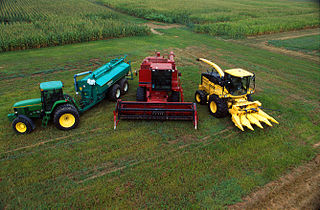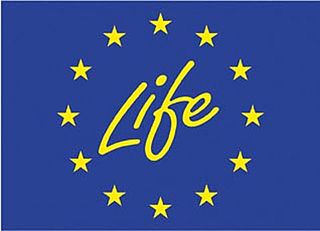Related Research Articles

The European Union (EU) is a supranational political and economic union of 27 member states that are located primarily in Europe. The union has a total area of 4,233,255.3 km2 (1,634,469.0 sq mi) and an estimated total population of about 447 million. The EU has often been described as a sui generis political entity combining the characteristics of both a federation and a confederation.

The Common Agricultural Policy (CAP) is the agricultural policy of the European Union. It implements a system of agricultural subsidies and other programmes. It was introduced in 1962 and has since then undergone several changes to reduce the EEC budget cost and consider rural development in its aims. It has, however, been criticised on the grounds of its cost and its environmental and humanitarian effects.

Agricultural policy describes a set of laws relating to domestic agriculture and imports of foreign agricultural products. Governments usually implement agricultural policies with the goal of achieving a specific outcome in the domestic agricultural product markets.

An agricultural subsidy is a government incentive paid to agribusinesses, agricultural organizations and farms to supplement their income, manage the supply of agricultural commodities, and influence the cost and supply of such commodities.
England Rural Development Programme is the instrument by which the UK Department for Environment, Food and Rural Affairs (Defra) fulfills its rural development obligations in England, as set out by the European Union. It is derived primarily from Council Regulation European Union Regulation No. 1257/1999 and the related successive implementing Commission Regulations.

The European Structural and Investment Funds are financial tools governed by a common rulebook, set up to implement the regional policy of the European Union, as well as the structural policy pillars of the Common Agricultural Policy and the Common Fisheries Policy. They aim to reduce regional disparities in income, wealth and opportunities. Europe's poorer regions receive most of the support, but all European regions are eligible for funding under the policy's various funds and programmes. The current framework is set for a period of seven years, from 2021 to 2027.

The Multiannual Financial Framework (MFF) of the European Union, also called the financial perspective, is a seven-year framework regulating its annual budget. It is laid down in a unanimously adopted Council Regulation with the consent of the European Parliament. The financial framework sets the maximum amount of spendings in the EU budget each year for broad policy areas ("headings") and fixes an overall annual ceiling on payment and commitment appropriations.

The European Union has a budget to finance policies carried out at European level.
On 26 June 2003, EU farm ministers adopted a fundamental reform of the Common Agricultural Policy (CAP) and introduced a new Single Payment Scheme for direct subsidy payments to landowners.

The Federal Agriculture Improvement and Reform Act of 1996, known informally as the Freedom to Farm Act, the FAIR Act, or the 1996 U.S. Farm Bill, was the omnibus 1996 farm bill that, among other provisions, revises and simplifies direct payment programs for crops and eliminates milk price supports through direct government purchases.
Interreg is a series of programmes to stimulate cooperation between regions in and out of the European Union (EU), funded by the European Regional Development Fund. The first Interreg started in 1989. Interreg IV covered the period 2007–2013. Interreg V (2014–2020) covers all 27 EU member states, the EFTA countries, six accession countries and 18 neighbouring countries. It has a budget of EUR 10.1 billion, which represents 2.8% of the total of the European Cohesion Policy budget. Since the non EU countries don't pay EU membership fee, they contribute directly to Interreg, not through ERDF.

The Food, Conservation, and Energy Act of 2008 was a $288 billion, five-year agricultural policy bill that was passed into law by the United States Congress on June 18, 2008. The bill was a continuation of the 2002 Farm Bill. It continues the United States' long history of agricultural subsidies as well as pursuing areas such as energy, conservation, nutrition, and rural development. Some specific initiatives in the bill include increases in Food Stamp benefits, increased support for the production of cellulosic ethanol, and money for the research of pests, diseases and other agricultural problems.

Hill farming or terrace farming is an extensive farming in upland areas, primarily rearing sheep, although historically cattle were often reared extensively in upland areas. Fell farming is the farming of fells, a fell being an area of uncultivated high ground used as common grazing. It is a term commonly used in Northern England, especially in the Lake District and the Pennine Dales. Elsewhere, the terms hill farming or pastoral farming are more commonly used.
The Revised Payment Services Directive is an EU Directive, administered by the European Commission to regulate payment services and payment service providers throughout the European Union (EU) and European Economic Area (EEA). The PSD's purpose was to increase pan-European competition and participation in the payments industry also from non-banks, and to provide for a level playing field by harmonizing consumer protection and the rights and obligations for payment providers and users. The key objectives of the PSD2 directive are creating a more integrated European payments market, making payments more secure and protecting consumers.
The Mid-term Review Reforms are a set of reforms of the EU’s Common Agricultural Policy adopted by the EU Council of Ministers on June 26, 2003. In summary, the main elements of the reformed CAP include: a single farm payment for EU farmers independent (decoupled) from production ; compliance with environmental, food safety, animal and plant health, and animal welfare standards in order to receive the single payment; increased funding for rural development and accompanying environmental or animal welfare measures; a reduction in direct payments (modulation) for larger farms to finance the expanded rural development program; an agreement to limit the CAP budget at the 2007 level through 2013; and some additional market price support cuts.
The local government in Ukraine consists of two systems based on administrative divisions of Ukraine. There are 24 oblasts, the Autonomous Republic of Crimea, and two city councils with special status (regions), with each region further divided into amalgamated hromadas and raions (districts).

Christos Papoutsis is a Greek socialist politician who has served as Minister for Citizen Protection (2010–12), Mercantile Marine Minister (2000–01) Member of the European Parliament (1984–95) and European Commissioner for Energy and Euratom Supply Agency, Small business and Tourism (1995–1999). He has also served as the Secretary of the Parliamentary Group and Parliamentary Spokesman for the Panhellenic Socialist Movement (PASOK), the majority party in Greece (2009–2010). He also was candidate for Mayor of Athens (2002).

Water supply and sanitation in Tanzania is characterised by: decreasing access to at least basic water sources in the 2000s, steady access to some form of sanitation, intermittent water supply and generally low quality of service. Many utilities are barely able to cover their operation and maintenance costs through revenues due to low tariffs and poor efficiency. There are significant regional differences and the best performing utilities are Arusha and Tanga.

The LIFE programme is the European Union's funding instrument for the environment and climate action. The general objective of LIFE is to contribute to the implementation, updating and development of EU environmental and climate policy and legislation by co-financing projects with European added value. LIFE began in 1992 and to date there have been five phases of the programme. During this period, LIFE has co-financed some 4600 projects across the EU, with a total contribution of approximately 6.5 billion Euros to the protection of the environment and of climate. For the next phase of the programme (2021–2027) the European Commission proposed to raise the budget to 5.45 billion Euro.

The community-led local development (CLLD) funding approach, initially limited to the rural areas under the name LEADER, is a European Union initiative to support development projects in rural, coastal and urban areas of EU member countries at the local scale by involving relevant local actors, including local organizations and associations, as well as individual citizens.
References
 This article incorporates public domain material from the Congressional Research Service document: Jasper Womach. "Report for Congress: Agriculture: A Glossary of Terms, Programs, and Laws, 2005 Edition" (PDF).
This article incorporates public domain material from the Congressional Research Service document: Jasper Womach. "Report for Congress: Agriculture: A Glossary of Terms, Programs, and Laws, 2005 Edition" (PDF).